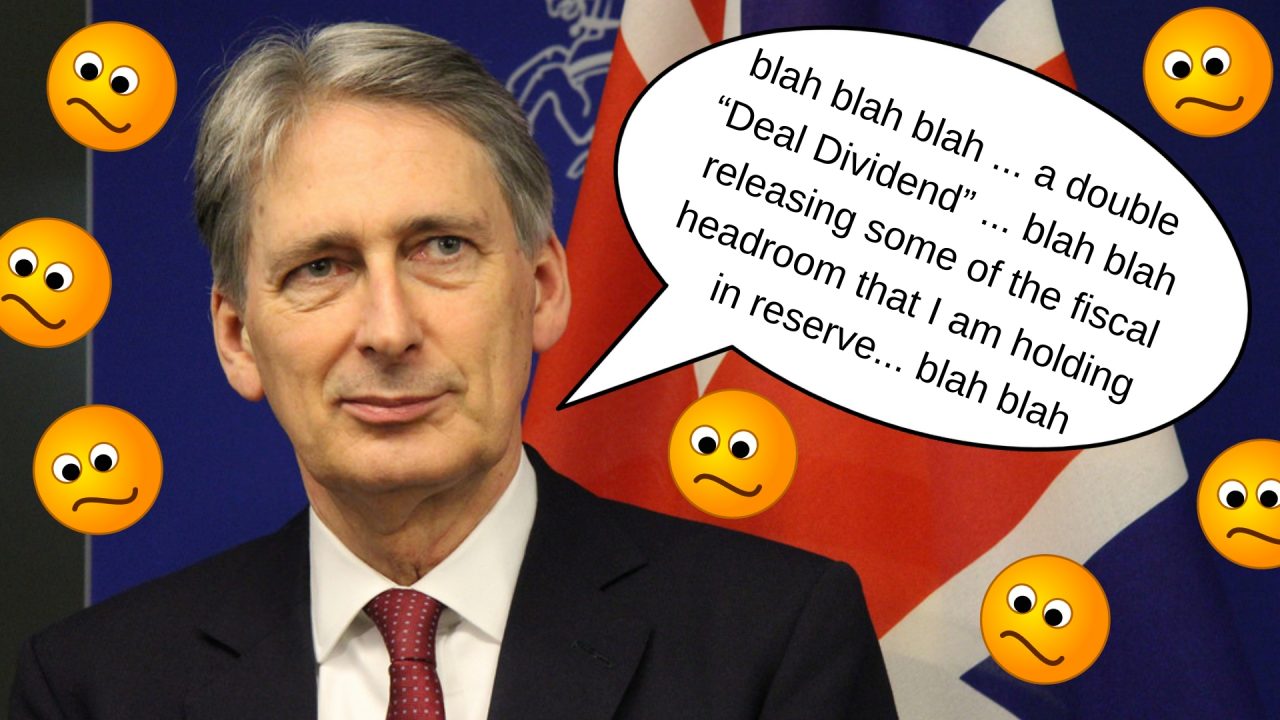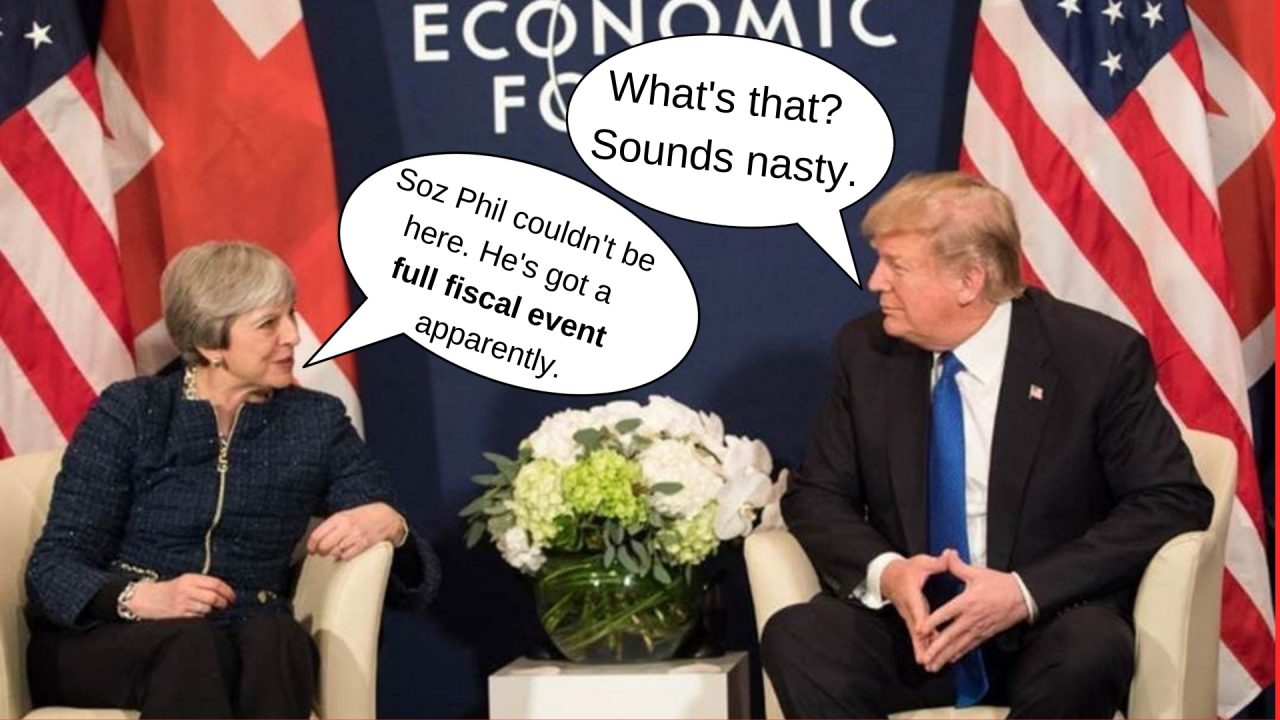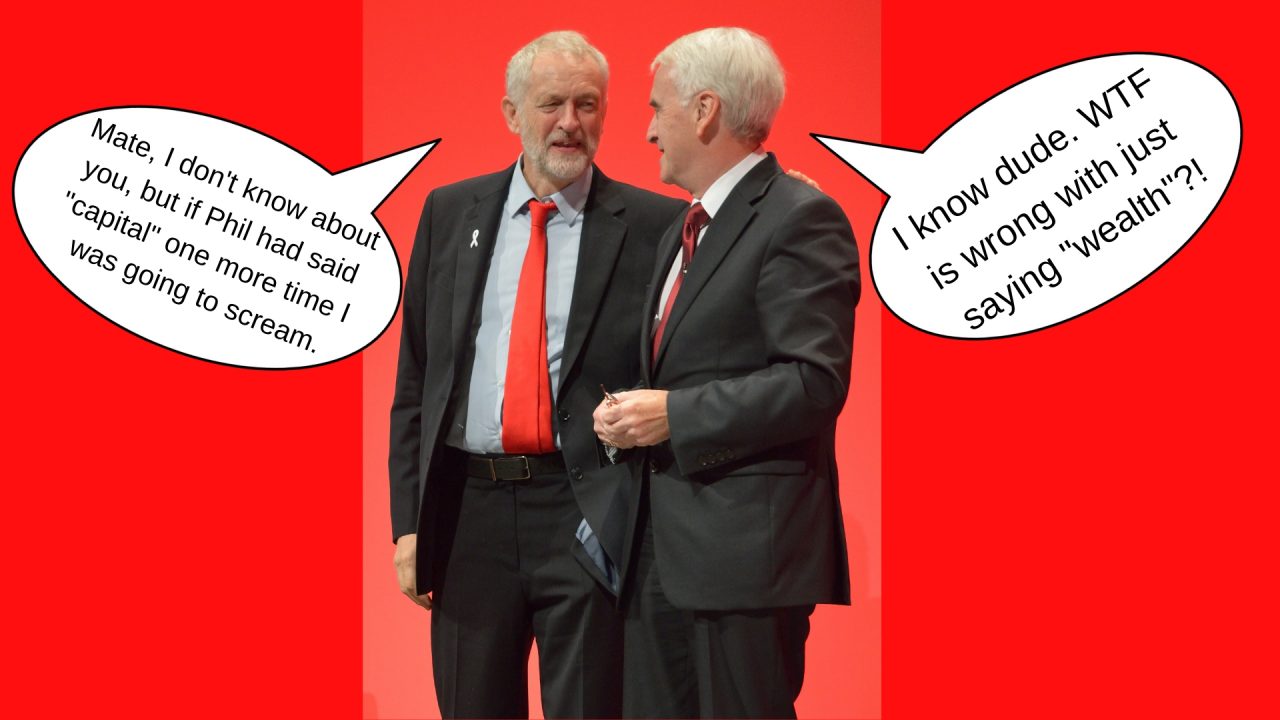
WTF was Fiscal Phil actually on about?
We love that the Budget speech is a conversation about the economy. But we don't love just how jam-packed it is with odd, confusing and jargony terms!
While we're working on getting Phillip Hammond and his successors to #DitchTheJargon (or at least support us on teaching it in schools), here's an Economy dictionary to help you decipher the Budget speech (the original speech is here).

[Disclaimer: unbelievably, this was not all the jargon he used. Yeah, we're a bit shocked too.]
business insolvencies
When a business runs out of money and can’t pay its debts.
capital
Wealth in terms of things we see as financially valuable. Could be in the form of money or other valuable things (swanky offices, gold-plated private planes, the Crown Jewels etc).
deal dividend
The large amount of money that some people expect the UK to get from making a deal with the EU after Brexit. That’s not because the EU will hand over a bunch of cash, but because businesses will decide Britain sounds like a spiffing place to set up shop, create lots of jobs and pay lots of tax.
economic growth
When a country creates more stuff or more valuable stuff (goods and services) proportionally to how many people live there - i.e. it doesn’t count if you just hire a bunch of new migrant workers. Economic growth is a controversial and often criticised measure of success.
equilibrium unemployment rate
The point at which the number of unemployed people won’t go any lower because everyone who would take a job if offered one is already working. That doesn’t mean everyone is happy working - people might think the jobs or wages on offer are crummy but better than nothing.
exports
Anything (mangos, divorce lawyer services) that is sold abroad.
financial year
A financial year typically runs from the 1st April to the 31st March (organisations can request to change their financial year start and end date). Each Budget is for one financial year. As to why the government can’t start a new year on the 1st January like the rest of us, it apparently has something to do with medieval religious holidays (let's hope the people in charge of our country are better at moving with the times in other areas, eh?).
fiscal
Anything related to government money. So fiscal spending is when the government spends money. Fiscal policy is how the government plans to manage its money - how its going to get money (e.g. by raising taxes) and how its going to spend it.
indexed in line with inflation
If something is indexed to inflation (e.g. wages, or an amount of money), that means it’s value will rise at the same time and by the same amount as any inflation. Inflation is when the prices of everything go up. The point of indexing things to inflation is to make sure you always get the same amount of bang for your buck. Imagine if your wages stayed the same but the price of your food and rent doubled - you’d be a lot poorer even though you technically weren’t earning any less money.
infrastructure pipeline
All the stuff that there are plans to build. Infrastructure is anything physical like roads, buildings and power lines.
IP-rich businesses
IP stands for intellectual property. It is anything valuable that comes from creativity and has no physical form: copyrights, brands, logos etc. An IP-rich business has lots of intellectual property.
long-life assets
Anything businesses expect to have some value after a year. Factories are long-life assets. A loaf of bread is not.

market economy
This is where what people sell and how much they sell it for is figured out between customers and businesses without any interference from the government. Fans of market economies think it works really well at giving everyone the best deal possible, because customers will only pay as much for something as its worth, and businesses that don’t sell fairly priced or high quality stuff will lose all their customers to businesses that do. People that don’t like it say that you can never have a totally fair exchange without some sort of government involvement, because, for example, we aren’t all born with the same chances, or we might end up getting scammed with no support.
net new jobs
The number of jobs that have been created after you take away all the jobs that have become defunct. So if a cafe buys a robot that is so good at making cups of tea that they fire all three of their teamakers but hire five robot maintenance people, the cafe will have created two net new jobs.
private sector
Anything (usually businesses) that are not owned by the government.
real wage growth
How much wages have grown compared to prices (inflation). If your salary doubled but so did your food and rent, you wouldn’t feel much richer.
SMEs
This stands for Small and Medium-sized Enterprises, where enterprise just means business. To be a SME a company must hire less than 250 people and make less than £12.9 million a year. About 99 percent of UK businesses are SMEs.
Spring Statement
A ‘mini-Budget’ that the government makes to Parliament (and everyone with access to a TV screen or the internet). Like the main Budget, it’ll say how the government thinks the economy is doing and how its raising and spending money.
sustainable funding
A money source that won’t run out. In the context of the Budget, it means the amount of money a government think it can commit to give something (like the health service or the police) without having to worry about it putting a strain on government budgets now or in the future.
speculative land-banking
When house-building companies buy up lots of land and then don’t build any houses on it (that’s the land-banking bit) because they believe the land itself will rise in value (that’s the speculative bit). The idea is that by hoarding land and waiting they can sell it for lots more than they bought it and make a huge profit.
tax avoidance
Not paying tax by legal methods.
tax evasion
Not paying tax by illegal methods.
vocational training
Learning how to do a specific job task or trade, such as tourism management or plumbing.




